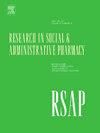Impact of medication therapy management on medication adherence and health-related quality of life among non-dialysis chronic kidney disease patients
IF 2.8
3区 医学
Q1 PUBLIC, ENVIRONMENTAL & OCCUPATIONAL HEALTH
Research in Social & Administrative Pharmacy
Pub Date : 2025-08-08
DOI:10.1016/j.sapharm.2025.08.002
引用次数: 0
Abstract
Background
Chronic kidney disease (CKD) is a progressive disease, often associated with poor medication adherence and reduced health related quality of life (HRQoL). Medication therapy management (MTM) is a range of services provided to patients and has been shown to enhance medication adherence and HRQoL, yet its impact on non-dialysis CKD patients remains underexplored. So, the study was aimed to see the impact of MTM on medication adherence and HRQoL among non-dialysis CKD patients.
Methodology
The prospective, open-labelled randomization-controlled study was conducted among CKD non-dialysis patients. HRQoL was assessed using KDQoL-36 questionnaire. Medication adherence was assessed using the medication adherence scale. Both were assessed at baseline; 6th and 12th month follow up. MTM group received clinical pharmacist's MTM services along with usual care (UC). UC group received the hospital team's general care from the Doctors, Nurses, and other health care professionals.
Results
A total of 220 CKD patients has been enrolled into the both groups in 1:1 ratio. At baseline, most of the patients were having medium adherence in both MTM 82 (74.54) and UC 77 (70) groups, followed by low adherence with p value 0.131. At 6th and 12th month follow-up. Medication adherence was increased in the MTM group compared to the UC group with p value <0.001. In the baseline, the more HRQoL score was found in the domain "symptoms and problems list" in both MTM 70.4 and UC groups 71.5 with the p value >0.05. The HRQoL scores of 5 domains were significantly increased at the 6th month and 12th month in the MTM group compared to the UC group with p value <0.05.
Conclusion
Study concluded, MTM services increased the medication adherence and HR-QoL of CKD non dialysis patients in MTM group compared to UC group. In future, MTM services can be implemented in healthcare settings.
药物治疗管理对非透析慢性肾病患者服药依从性和健康相关生活质量的影响
背景:慢性肾脏疾病(CKD)是一种进行性疾病,通常与药物依从性差和健康相关生活质量(HRQoL)降低相关。药物治疗管理(MTM)是为患者提供的一系列服务,已被证明可以提高药物依从性和HRQoL,但其对非透析CKD患者的影响仍未得到充分探讨。因此,本研究旨在观察MTM对非透析CKD患者药物依从性和HRQoL的影响。方法:前瞻性,开放标签随机对照研究在CKD非透析患者中进行。采用KDQoL-36问卷评估HRQoL。采用药物依从性量表评估药物依从性。在基线时对两者进行评估;第6、12个月随访。MTM组在常规护理(UC)的同时接受临床药师的MTM服务。UC组接受医院团队的一般护理,由医生、护士和其他卫生保健专业人员提供。结果:共220例CKD患者按1:1的比例被纳入两组。在基线时,MTM 82组(74.54)和UC 77组(70)的大多数患者均为中等依从性,其次是低依从性(p值0.131)。在第6和12个月的随访中。与UC组相比,MTM组药物依从性增加,p值为0.05。MTM组在第6个月和第12个月的5个域HRQoL评分均较UC组显著升高,差异有p值。结论:MTM服务较UC组提高了CKD非透析患者的药物依从性和HR-QoL。将来,MTM服务可以在医疗保健环境中实现。
本文章由计算机程序翻译,如有差异,请以英文原文为准。
求助全文
约1分钟内获得全文
求助全文
来源期刊

Research in Social & Administrative Pharmacy
PUBLIC, ENVIRONMENTAL & OCCUPATIONAL HEALTH-
CiteScore
7.20
自引率
10.30%
发文量
225
审稿时长
47 days
期刊介绍:
Research in Social and Administrative Pharmacy (RSAP) is a quarterly publication featuring original scientific reports and comprehensive review articles in the social and administrative pharmaceutical sciences. Topics of interest include outcomes evaluation of products, programs, or services; pharmacoepidemiology; medication adherence; direct-to-consumer advertising of prescription medications; disease state management; health systems reform; drug marketing; medication distribution systems such as e-prescribing; web-based pharmaceutical/medical services; drug commerce and re-importation; and health professions workforce issues.
 求助内容:
求助内容: 应助结果提醒方式:
应助结果提醒方式:


